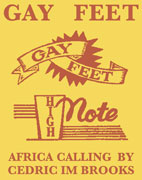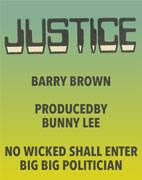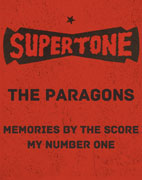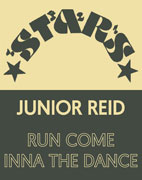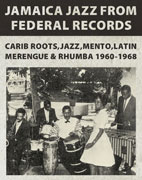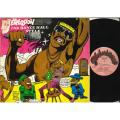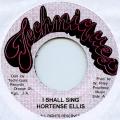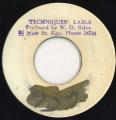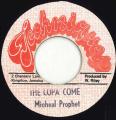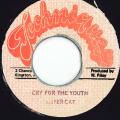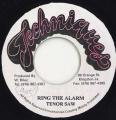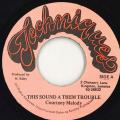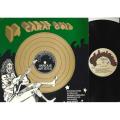TechniquesText by Harry Hawks
"Yet I want nothing out of it. A man can get fi him credit. I get my credit from the work I do." Winston Riley
Techniques
| Founded | 1968 |
| Place of Establishment | Chancery Lane Kingston Jamaica |
| Main Studio(s) | Channel One Studio |
| Founder | Winston Riley |
| Producer(s) | |
| Engineer(s) | Soljie |
| Related Artist(s) |
"The Techniques have been preaching the message of love ever since they came together in the early Sixties. Their lead singers have all left the group to become powerful forces on the reggae scene still emitting the essence of love as the basis of unity and peace." Balford Henry
Winston Riley formed the first incarnation of The Techniques in 1962 at Kingston Senior School and Chocomo Lawn Youth Club. The original members were Winston Riley, Keith Slim Smith, Frederick Waite and Franklyn White and later Pat Kelly, Junior Menz, Jackie Paris, Bobby Davis, Bruce Ruffin, Jimmy Riley, Dave Barker, Lloyd Parks, Morvin Brooks and 'Johnny' from 'Johnny & The Attractions'. The original Techniques could not only sing but also learnt to play instruments at Chocomo Lawn, "a club developed by Edward Seaga", where they were introduced to "these guys from Columbia". Their first recording 'No One' was released internationally on the Columbia label and, as members of the Victors Youth Band, they numbered among the champions in the 'Ska And Mento' contest in the 1964 Jamaica Festival.
"We even had our own band called The Victors 'cause we, all of us from the group, learned to play instruments. I never really played none as such. I can play piano but not that strong. Slim Smith used to play drums, Franklyn White used to play bass, Frederick Waite used to play guitar." Winston Riley
The Techniques recorded for Sonia Pottinger's Gay Feet, Ken Khouri's Kentone and Byron Lee and Ronnie Nasralla's Gala labels and in 1965 Stranger Cole introduced the group to Duke Reid down on Bond Street. Their first big hit was a ska record, 'Little Did You Know', released on Duke's Treasure Isle label with Slim Smith on lead vocal but "rock steady was the key" and, as ska progressed to rock steady, The Techniques really began to come into their own. The group, all accomplished vocalists, would exchange lead vocals and harmony parts and The Techniques stayed with Treasure Isle recording hit after hit after hit after hit, until 1967. Slim Smith and Franklyn White left the group that year to form the first version of The Uniques with Roy Shirley. The Uniques' beautiful, yearning 'Let Me Go Girl' recorded for Bunny Striker Lee was, according to Striker, "the baddest tune for 1967!" Roy and Slim left soon after to pursue solo careers for a brief while until The Uniques came together again with Slim, Lloyd Charmers Tyrell and Jimmy Riley.
"At the Carib Theatre, the Sate Theatre, the Regal Theatre and the Music Union they stole the show from any other group performing... " Jimmy Riley
"Before The Wailers hit the most popular group was The Techniques with Slim Smith... "
Clement 'Coxsone' Dodd(CS Dodd) quoted in Timothy White's 'Catch A Fire'
Pat Kelly, a naturally gifted singer with a fine soulful falsetto, was recruited into The Techniques and the group continued to create classic hits at Treasure Isle with Pat singing lead. Bruce Ruffin also joined The Techniques as a songwriter and singer to fill the huge gap left by Slim's departure. Their adaptation of The Impressions' 'You'll Want Me Back' entitled 'You Don’t Care' was a massive hit and the Curtis Mayfield songbook was studied once again when The Techniques sang over The Impressions' 'Minstrel & Queen' as 'Queen Majesty'. Both songs have subsequently assumed legendary status in Jamaica. Pat would later sing with The Uniques and go on to enjoy a very successful solo career which took off in a big way when he recorded 'How Long Will It Take' for Bunny Striker Lee.
In 1968 Winston took the then unprecedented step of forming his own label "let me just try a thing... first of all I mentioned it to the guys and everybody refused" and he borrowed money from his mother and set up the Techniques label with his brother Buster. Winston "played a very important part. I was the producer and real arranger during that period of the group" and he continued to sing and use various combinations of singers under different names such as The Shades (which included Tyrone Evans) and The Sensations. The first releases on Winston's Techniques label were 'Come Back Darling' by Johnny Osbourne and 'Who You Gonna Run To' by The Techniques. Both proved to be major hits and Winston Riley never ever looked back.
Dave Barker (real name Dave Crooks not Collins) was one of Jamaica's most impassioned vocalists and he sang with The Techniques on tunes such as the searing 'Your Love's A Game' which was written by Bruce Ruffin but Lee 'Scratch' Perry (Lee Perry) stated "Dave can do any damn thing man!" And in 1970 Winston recruited Dave to deejay an Ansel Collins rhythm called 'Double Barrel' which was credited to Dave & Ansel Collins. In early 1971 Dave Barker became the first Jamaican deejay to ever top the UK National Charts with 'Double Barrel' when the record was released on the Techniques label by Trojan Records in London. Winston Riley, Dave Barker and Ansel Collins repeated their success when the follow up, 'Monkey Spanner', reached Number Seven in the UK National Charts later that year.
Winston Riley opened his Techniques Record Shop in Chancery Lane, off Kingston's North Parade, the following year. And as each successive style and fashion in Jamaican music came and went Winston remained right at the forefront where his matchless musical experience was always accompanied by his uncompromising business acumen. In the early seventies, realising that soulful, harmony groups like The Techniques were out of step with the dread, deejay and dub dominated times, he wrote, arranged and produced some of the most penetrating roots records of the period: 'Purify Your Heart' from Johnny Osbourne, 'Nothing Is Impossible' by The Interns, 'All Nations Bow' from Big Youth and Technique Morvin Brooks' sombre call to arms 'Cheer Up Black Man'. Winston also produced one of the hardest dub albums ever, 'Meditation Dub', for his Techniques label and the music's most enduring and adaptable rhythm ever 'Stalag 18'.
As the eighties opened and the dance hall style took over Winston was at the eye of the storm, as always, with General Echo's 'Slackest LP' now rightly regarded as a key record and catalyst in the development of dance hall music. Tenor Saw's cut to the "Stalag" rhythm entitled ' Ring The Alarm' was a major hit and has never stopped selling since it was first released in 1985. One of the first to record Frankie Paul, on releases including 'Wanna Say I Love You' and 'You Are So Good To Me', Winston was also the man behind Super Cat's 'Boops', one of the funniest and most memorable outings of the decade. As computer built rhythms gained the ascendancy Winston began working with one of the major architects of the genre: Wycliffe 'Steely' Johnson.
"In this era Steely is one of my most admired musicians. If you have an idea and give it to Steely then Steely can build around it..." Winston Riley
Winston's business empire expanded into a new state of the art premises at 99 Orange Street in 1993 and he continued to be both a driving force and guiding light in the Jamaican music business. As well as the latest releases a superb selection of re-pressed classics on his Techniques label were always available in Winston's store. But Winston never sought fame or status and was content with the satisfaction of knowing that a job had been done properly. Both within and without the group other members of The Techniques have invariably stamped their trade mark of quality on every project that they have ever undertaken.
According to the Jamaica Observer of 20th January 2012 Winston "had been plagued by a series of violent attacks. He was shot in August last year and later stabbed five times in September. He was shot in the back of the head in November and was in a coma since he was attacked". Winston never recovered after the last shooting and he died in hospital in Kingston on 19th January 2012.
Winston Riley was not only hugely talented but was also a true gentleman. It was invariably a pleasure to meet him and I feel honoured to have had the privilege, albeit in a very minor way, of working with him. His son Kurt described Winston as "a straightforward man, who was allergic to hypocrisy" and there is nothing I can add to that. Our sincere condolences are extended to his family at this tragic time.
May Winston's soul rest in peace.
Date Added: Apr 15, 2016
Copyright (C) 2024 Dub Store Sound Inc.
Related Item(s)
| Various - DJ Explosion Ina Dance Hall Style(Techniques)LP=EX-/SEW/SLD/stain CVR=EX-/SSD |
| Vin Gordon - It's Your Things Instrumetal (Wr 5)(Techniques-Pre)VG-/SEW/WOL/stamp |
B side) Alton Ellis - I'll Be Waiting
| Super Cat - Cry Fi Di Youth(Techniques)EX--/SEW/SLD/SLOC/stain |
| Tenor Saw - Ring The Alarm(Techniques-Re (Old Press))EX-/SEW/WOL/stain |











